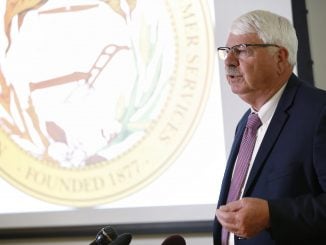RALEIGH — In remarks delivered at the 2023 North Carolina Agriculture Forum, Commissioner Steve Troxler said it was a good year for the state in terms of crop yields, commodity prices and overall trends.
The forum was held on Feb. 2 in the Holshouser Building located at the N.C. State Fairgrounds.
“I remain optimistic about the future of N.C. Agriculture and agribusiness, but I worry about people being able to afford it,” Troxler said, highlighting rising inflation and increasing input costs. He also said commodity prices are remaining strong.
“If commodity prices dive before input costs, that is another thing that is difficult to deal with,” Troxler said, adding that high input costs represent financial risks for farmers.
Troxler also warned that population dynamics is becoming a challenge that needs to be addressed with fewer people farming coupled with the loss of viable farmland amid a rapidly growing state population.
Citing the American Farmland Trust, Troxler said North Carolina is predicted to be 2nd in the nation for potential farmland loss by 2040. He also noted that 135,000 moved to North Carolina in the last year, ranking the state at number 3 in the nation for population migration. Urban areas like Raleigh and Charlotte were ranked number two and number six respectively for population growth.
Energy resources will also be strained by the state’s increasing population growth, Troxler said while also mentioning the recent rolling blackouts that hit portions of the state last December. He also mentioned the possible political ramifications for agriculture due to new residents coming in from out of state who have no grasp of the importance of farming in the state.
The topic of farmland preservation was stressed by Troxler in his remarks and has been a key issue for him over the course of his 18-year tenure as the state’s agriculture commissioner.
“I don’t ever see farmland preservation coming off the priority list because of the development taking place across this state and because of the interest in our state as a business destination,” said Troxler, later adding that “We need to decide as a state this is a priority.”
“We continue to rally support for farmland preservation so we can secure the resources future generations need,” Troxler said, adding that his agency has been able to protect 30,000 acres through the Agriculture Development and Farm Preservation Trust Fund since its inception.
During his remarks on the loss of farmland, Troxler mentioned Wake County now accepting applications for a new Farmlands Preservation program. Wake County has lost almost 20% of farm and forest land over the course of the last nine years. As the county’s growth rate continues to explode, current lands that are not preserved could disappear in the next quarter century due to development.
Troxler laid out his 2023 legislative priorities in one word: Investment.
The commissioner said there needs to be investment in the people in his department, particularly when it comes to salaries. He cited large vacancies of 17 to 19 percent and that existing employee salaries were too low.
The other priorities for Troxler included investing in natural resources through farmland preservation and more investment in agricultural research.
“Instead of resting on our laurels with agricultural research, we’ve got to speed it up,” said Troxler.
Prior to giving his State of Agriculture remarks, Troxler named Flowers Timber Company of Seven Springs in Wayne County as the NC 2022 Exporter of the Year. The company, which exports to such countries as China, Cambodia, India, Pakistan and Spain, recorded $15 million in export revenue in 2022.
The 2023 Agriculture Forum opened up with an economic outlook presentation given by Dr. Blake Brown, the Hugh C. Kiger Professor of Agriculture and Resource Economics at N.C. State University.
Immigration and labor issues related to H2a visas were among the topics covered by Brown, who noted “making H2a difficult and expensive makes it not only hard on farmers but hard on the workers.”
Brown also discussed the topic of “cultured meat,” which is meat grown in a lab, and characterized it as a possible “paradigm shift” should it gain acceptance with consumers. Brown questioned of how a shift like that would impact the North Carolina livestock industry and agreed it was an area that needed to be monitored.
Farm cash receipts in 2021 topped $13.28 billion; crops made up 30% and livestock, dairy, and poultry made up nearly 70% of the total.
Troxler presented Brown with the N.C. Ambassador of Agriculture award for his long and notable history service in the field.
A panel following Brown’s remarks discussed the ongoing war in Ukraine and the war’s impact on North Carolina over the past year.
The panel was moderated by Dr. Sandy Stevens and included Owen Wagner, vice president of North American Grains and Oilseeds Analysis for Rabotank; Mike Quinn, vice president of Cotton Operations for Gildan, Mike Ready, the sales manager of the Agriculture Division Government for James River Equipment; and Peter Thornton, director of the North Carolina Department of Agriculture and Consumer Services’ Marketing Division.
The impact on commodity prices due to rising cost of fuel, fertilizer, and equipment mentioned earlier by Brown was discussed, as were the implications of China’s proxy war over control of Taiwan and the “cozy” relationship developing between Brazil, China and Russia.
Substantial discussion also centered on shifting markets related to the Black Sea Grain Deal; an agreement brokered by the United Nations between Russia, Ukraine, and Turkey for safe passage of food and grain shipping out of Ukrainian ports.
The forum also included remarks by National Association of State Departments of Agriculture CEO Ted McKinney, who focused on paying attention to possible impacts to trade activity in the South China Sea, but also not to count out opportunities with India. He also discussed increasing regulatory burdens in the European Union that could impact American exports.
McKinney remarked on the geopolitical alliance evolving between China and Russia as “not pleasant” while also noting price transparency with regard to grain enterprises was becoming an issue as those enterprises in Russia were increasingly becoming state-owned.


